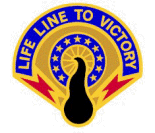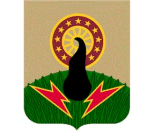262nd Quartermaster Battalion
 The 262nd Quartermaster Battalion trains and provides support to soldiers in three AIT Training Departments: Petroleum and Water Department, Aerial Delivery and Field Services Department, and the Mortuary Affairs Center.
The 262nd Quartermaster Battalion trains and provides support to soldiers in three AIT Training Departments: Petroleum and Water Department, Aerial Delivery and Field Services Department, and the Mortuary Affairs Center.
The 262d Quartermaster Battalion ensures training to standard for the soldiers who are ready to provide fuel and water to America's Fighting Force. Through excellent leadership and positive command and control, the 262d supports five companies and three training departments responsible for six Quartermaster military occupational specialties (MOSs). Two of the five companies are advanced individual training (AIT) units for these military occupational specialties (MOSs): 77F (Petroleum Supply Specialist), 77L (Petroleum Laboratory Specialist) and 77W (Water Treatment Specialist). Soldiers in these fuel and water MOSs train at the Petroleum and Water Department (PWD), US Army Quartermaster Center and School.
Headquarters and Headquarters Company is responsible for providing command, control, logistics, and administrative support to over 190 permanent party soldiers, including the Battalion staff and Army personnel who work in three Training Departments: Aerial Delivery and Field Services Department, the Mortuary Affair Center, and the Petroleum and Water Department. HHC ensures all these personnel are administratively, technically, and tactically prepared for worldwide deployment, and has primary responsibility for maintaining the Log Warrior field exercise training site.
Charlie Company trains soldiers in four Military Occupational Specialties: 92R (Parachute Rigger), 43M (Fabric Repair Specialist), 57E (Laundry and Shower Specialist), and 92M (Mortuary Affairs Specialist). Charlie Company consists of nine cadre members and approximately 150 soldiers in training. Charlie Company also ensures that all permanent party are administratively, technically, and tactically prepared for worldwide deployment.
India Company trains soldiers who have prior military service in all ten of the Quartermaster Military Occupational Specialties. India Company also trains soldiers taking short skill courses which do not result in a new specialty. India Company consists of twelve cadre members and approximately 150-350 soldiers in training. All of India Company soldiers are considered permanent party and have permanent party privileges. India Company also ensures that all permanent party are administratively, technically, and tactically prepared for worldwide deployment.
Uniform Company trains soldiers in two Military Occupational Specialties: 77F (Petroleum Supply Specialist) and 77W (Water Purification Specialist). Uniform Company consists of ten cadre members and approximately 200 soldiers in training. Uniform Company also ensures that all permanent party are administratively, technically, and tactically prepared for worldwide deployment.
Victor Company trains soldiers in two Military Occupational Specialties: 77F (Petroleum Supply Specialist) and 77L (Petroleum Laboratory Specialist). Victor Company consists of ten cadre members and approximately 200 soldiers in training. Victor Company also ensures that all permanent party are administratively, technically, and tactically prepared for worldwide deployment.
Soldiers in training at Petroleum and Water Department (PWD) are assigned to the battalion's Uniform and Victor Companies. The 262d's drill sergeants are assigned directly to the AIT companies and are qualified in the MOS in which their soldiers are training. Drill sergeants are role models and subject matter experts (SMEs) who lead by example in a positive training environment.
The battalion's drill sergeants use three basic components to make sure that AIT students become MOS qualified: academics, physical fitness training, and Army Values. Academics are taught at PWD by noncommissioned officers (NCOs) who are SMEs in their MOSs. The PWD instructors give the 262d drill sergeants weekly academic reports for weekly counseling sessions with their soldiers. Drill sergeants lead physical fitness training with assistance from PWD's NCOs. This "one team, one fight" concept works. Instilling and reinforcing the seven Army Values at every turn is not only the responsibility of the drill sergeants, but also the responsibility of everyone who comes in contact with soldiers in training.
In weekly face-to-face counseling, both verbal and written, students identify ways to improve performance. Solutions are planned. Written academic reports and the drill sergeant's assessment of the soldier's overall development in the Army Values system are part of the critical soldierization process. The system, which includes awarding progressive privileges for achievement, keeps soldiers motivated to progress further each week toward the goal of becoming fully MOS qualified.
At the end of week four, AIT soldiers who meet the criteria for success in all areas are ready for the Rites of Passage Ceremony. This ceremony is the halfway point on the way to becoming a 77 series soldier. Soldiers receive individual Quartermaster Regimental Crests from their company commanders and an official welcome into the Regiment.
At every step, the 262d Battalion's drill sergeants and PWD NCOs work together as a team. These Army professionals provide units with mentally capable, physically fit, highly dedicated and motivated soldiers who are proud to serve. Above all else, these Quartermasters look, think and act like soldiers, always.
 The 262nd Quartermaster Battalion (Service) was established on 13 March, 1942 and was called to duty on 28 July, 1942, at Camp Pickett, VA.
The 262nd Quartermaster Battalion (Service) was established on 13 March, 1942 and was called to duty on 28 July, 1942, at Camp Pickett, VA.
Assigned to the European Theater of Operations in World War II, soldiers of the 22nd arrived in England on August 1943, and spent the next ten months assisting with preparations for the Normandy Invasion. As D-Day approached, the Battalion joined others of the 1st Engineer Special Brigade adding support to the assault forces.
The 262nd crossed the English Channel on D+4 and continued to provide outstanding support until the fighting ceased. Its wartime honors for this period include three campaign streamers and a French Croix d Guerre, with Palm showing the Normandy Inscription. The unit continued operating in France until it was deactivated on 28 May 1946.
The 262nd Quartermaster Battalion (Petroleum) was reactivated at Fort Lee, Virginia, on 4 January 1967 in response to the logistics buildup in Vietnam. After five months of intensive preparation, the unit arrived at Cam Ranh Bay, Republic of Vietnam on 4 June 1967.
While at Cam Ranh Bay, the unit was responsible for providing support needed to monitor pipeline operations. They provided limited wholesale distribution of bulk petroleum, surveillance activities, and storage operations throughout Vietnam.
Soldiers of the 262nd Quartermaster Battalion demonstrated great competence during Vietnam by transporting more than 22 million gallons of POL and efficiently operating several Forward Supply Points. For these and other activities, the Battalion was awarded a Meritorious Unit Citation and ten campaign streamers before being deactivated, in Vietnam, on 13 August 1970.
The motto of the Battalion was "Lifeline to Victory" to indicate that petroleum is the life blood of the combat force.
On 12 February 1987, the 262nd Quartermaster Battalion was again reactivated at Fort Lee, VA. This time the Battalion was called up for peacetime operations. It was determined that, as part of the Army Program of Regimental Distinction, the Quartermaster Regimental Organization qualified for the recognition of the old Quartermaster School Brigade. The Brigade and its assigned Battalions were awarded unit designations of selected Quartermaster combat units with honored service to the Corps. The 262nd Quartermaster Battalion replaced the old 2nd Battalion of the Quartermaster Brigade. The Battalion's current mission is training soldiers in seven separate Military Occupational Specialties.
Join the GlobalSecurity.org mailing list

